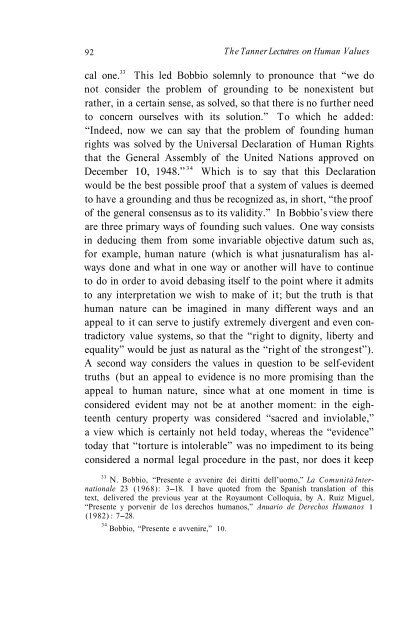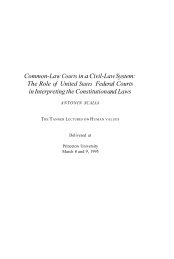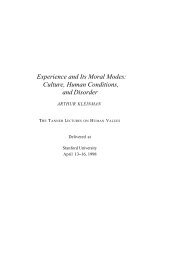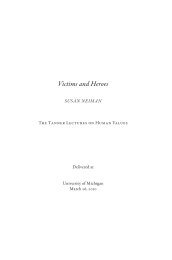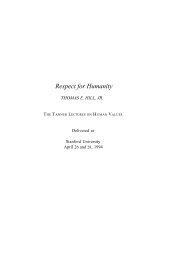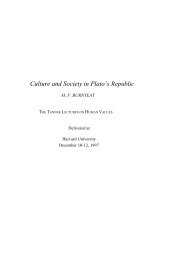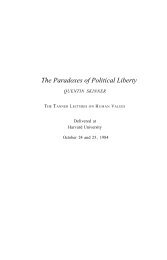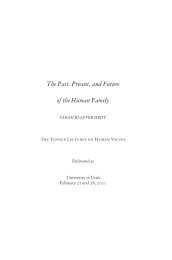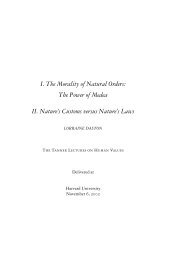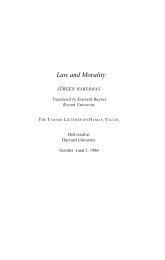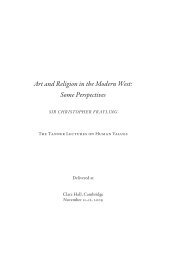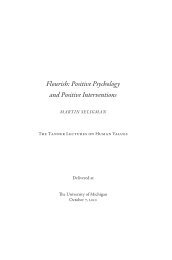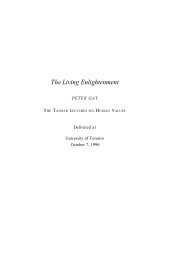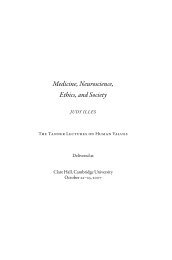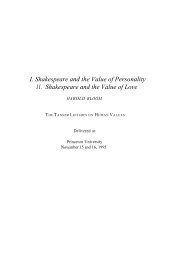Muguerza, Javier - The Tanner Lectures on Human Values
Muguerza, Javier - The Tanner Lectures on Human Values
Muguerza, Javier - The Tanner Lectures on Human Values
Create successful ePaper yourself
Turn your PDF publications into a flip-book with our unique Google optimized e-Paper software.
92 <str<strong>on</strong>g>The</str<strong>on</strong>g> <str<strong>on</strong>g>Tanner</str<strong>on</strong>g> Lectutres <strong>on</strong> <strong>Human</strong> <strong>Values</strong>cal <strong>on</strong>e. 33This led Bobbio solemnly to pr<strong>on</strong>ounce that “we d<strong>on</strong>ot c<strong>on</strong>sider the problem of grounding to be n<strong>on</strong>existent butrather, in a certain sense, as solved, so that there is no further needto c<strong>on</strong>cern ourselves with its soluti<strong>on</strong>.” To which he added:“Indeed, now we can say that the problem of founding humanrights was solved by the Universal Declarati<strong>on</strong> of <strong>Human</strong> Rightsthat the General Assembly of the United Nati<strong>on</strong>s approved <strong>on</strong>December 10, 1948.” 34Which is to say that this Declarati<strong>on</strong>would be the best possible proof that a system of values is deemedto have a grounding and thus be recognized as, in short, “the proofof the general c<strong>on</strong>sensus as to its validity.” In Bobbio’s view thereare three primary ways of founding such values. One way c<strong>on</strong>sistsin deducing them from some invariable objective datum such as,for example, human nature (which is what jusnaturalism has alwaysd<strong>on</strong>e and what in <strong>on</strong>e way or another will have to c<strong>on</strong>tinueto do in order to avoid debasing itself to the point where it admitsto any interpretati<strong>on</strong> we wish to make of it; but the truth is thathuman nature can be imagined in many different ways and anappeal to it can serve to justify extremely divergent and even c<strong>on</strong>tradictoryvalue systems, so that the “right to dignity, liberty andequality” would be just as natural as the “right of the str<strong>on</strong>gest”).A sec<strong>on</strong>d way c<strong>on</strong>siders the values in questi<strong>on</strong> to be self-evidenttruths (but an appeal to evidence is no more promising than theappeal to human nature, since what at <strong>on</strong>e moment in time isc<strong>on</strong>sidered evident may not be at another moment: in the eighteenthcentury property was c<strong>on</strong>sidered “sacred and inviolable,”a view which is certainly not held today, whereas the “evidence”today that “torture is intolerable” was no impediment to its beingc<strong>on</strong>sidered a normal legal procedure in the past, nor does it keep33 N. Bobbio, “Presente e avvenire dei diritti dell’uomo,” La ComunitàInternati<strong>on</strong>ale23 (1968): 3-18. I have quoted from the Spanish translati<strong>on</strong> of thistext, delivered the previous year at the Royaum<strong>on</strong>t Colloquia, by A. Ruiz Miguel,“Presente y porvenir de los derechos humanos,” Anuario de Derechos <strong>Human</strong>os 1(1982) : 7-28.34Bobbio, “Presente e avvenire,” 10.


